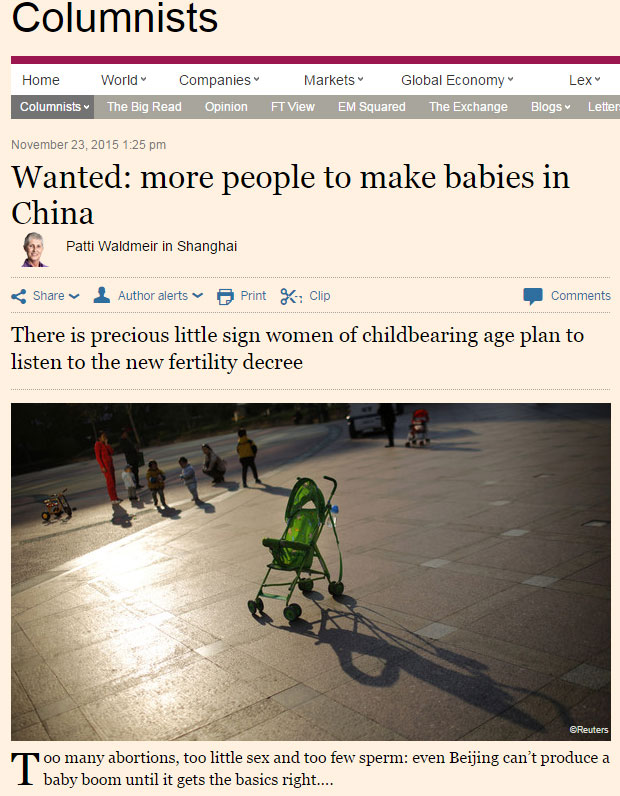


(Screenshot of FT webpage)
The English daily newspaper, Financial Times published an article entitled “Wanted: more people to make babies in China” on its website on November 23, saying that China is suffering a “sex shortage”, as its “white collar workers slave so long in the office that half said they had intercourse less than once a month”.
It says,“Or maybe it has something to do with the fact that a large proportion of 20-somethings still live with their mother (and for that matter, their grandmothers) in cramped urban flats. Surely that’s better than the best contraceptive.” The article eventually draws a conclusion that China’s new two-child policy dooms to fail in making more babies.
Leave aside the obviously missing logic in this article. Let’s take a look at some Chinese netizens’ reactions:
“小小life大大愛”:Less than once a month? I don’t believe this is true. Can I say the survey respondents just happen to be impotent? I personally can only live without it for a day in a month.
“我們一起曬月亮”:Common in U.K., hah?
“過路客”:I just want to say: the style of this British newspaper is so amusing.
“而立之年前四年”:There is definitely a marketing team of Durex behind this. Durex is headquartered in U.K. Haha, busted!
“蕭書濟寧東部”:Well, how did you know?
“絕望主婦綜合癥”:Western media know everything?! They don’t know a damn thing!
The author of this article Patti Waldmeir, Financial Times’ correspondent in Shanghai made her argument that Chinese white collar having sex “l(fā)ess than once a month” just based on “one recent survey”, but failed to mention who made the survey, when, where, or how.
This “recent survey” is succeeded by a “maybe” in the article, leading to an even more appallingly groundless statement that “a large proportion of 20-somethings still live with their mother (and for that matter, their grandmothers) in cramped urban flats”.
Since when correspondents take it for granted to “maybe” his or her readers?
We happen to have our statistics here, if Ms. Waldmeir would like to take the time to read it. Peking University Institute of Social Science Survey released a report entitled “China’s Development Report of People’s Well-being” in 2012, which shows that 75.2 percent of married couples do not live with their parents in China.
Or MAYBE, maybe Ms. Waldmeir still lives in the 70s Shanghai, where three generations of a family crowded in a small shabby room?
It does not take us long to find that most of the Financial Times articles on China are based on biased assumptions and groundless accusations. Their using “may be” or “l(fā)ikely to be” is neither respectful to facts nor responsible for the readers. No wonder this paper has lost its legacy of being a well-known opinion field, and has been sold to Japan.
 J-10B fighters with homegrown engine in test fligh
J-10B fighters with homegrown engine in test fligh Photos of U.S. Navy intruding in South China Sea released
Photos of U.S. Navy intruding in South China Sea released Cats who immediately regretted their life choices in photographs
Cats who immediately regretted their life choices in photographs Beautiful girl from police college becomes Internet hit
Beautiful girl from police college becomes Internet hit 10 tons of copper coins unearthed in 2,000-yr old tomb
10 tons of copper coins unearthed in 2,000-yr old tomb In Pics: Amazing Chinese fighters
In Pics: Amazing Chinese fighters
 Chinese, U.S. navies hold first-ever joint exercise in the Atlantic
Chinese, U.S. navies hold first-ever joint exercise in the Atlantic When a Chinese woman marries an Indian man
When a Chinese woman marries an Indian man Photos of beautiful teacher hit the Internet
Photos of beautiful teacher hit the Internet Top 20 hottest women in the world in 2014
Top 20 hottest women in the world in 2014 Top 10 hardest languages to learn
Top 10 hardest languages to learn 10 Chinese female stars with most beautiful faces
10 Chinese female stars with most beautiful faces China’s Top 10 Unique Bridges, Highways and Roads
China’s Top 10 Unique Bridges, Highways and Roads Snow country for cold men
Snow country for cold men Putin faces tough choice after jet downed
Putin faces tough choice after jet downed Crackdowns on animal trade don’t deter buyers
Crackdowns on animal trade don’t deter buyers Shanghai’s booming rent-a-companion business
Shanghai’s booming rent-a-companion businessDay|Week